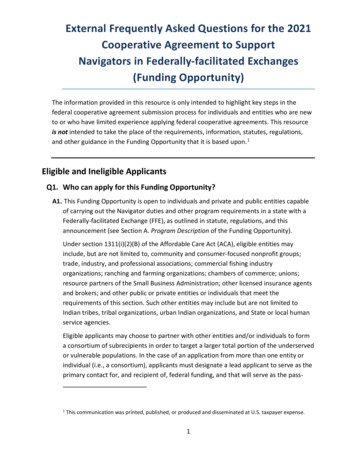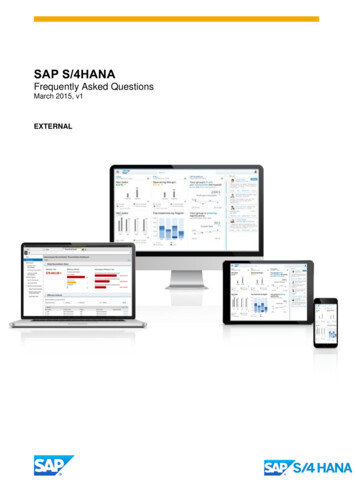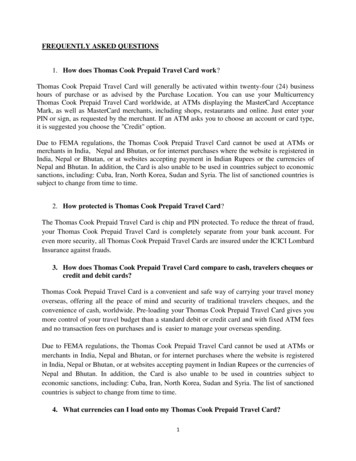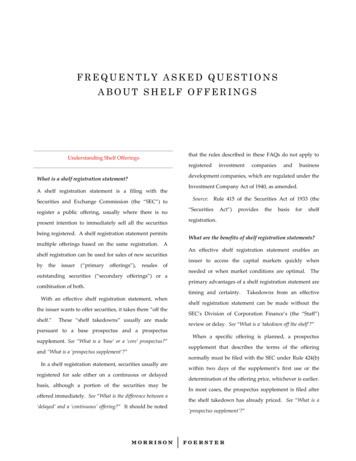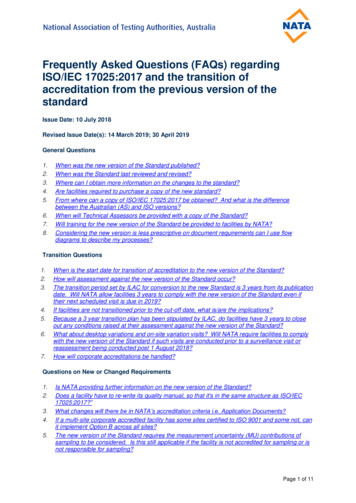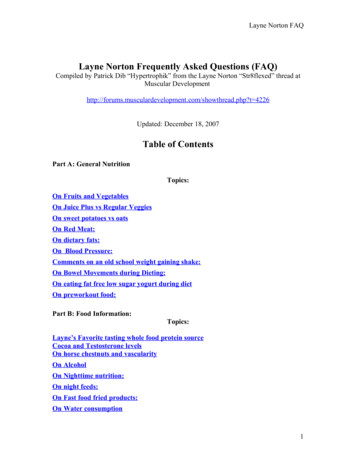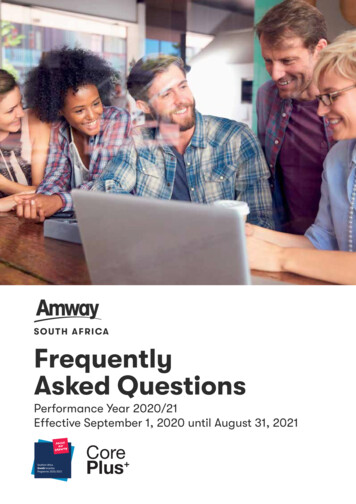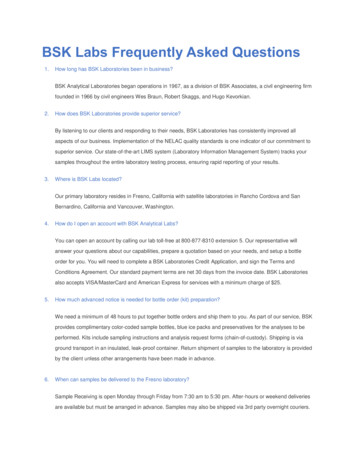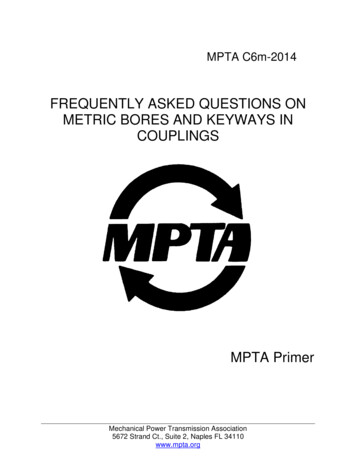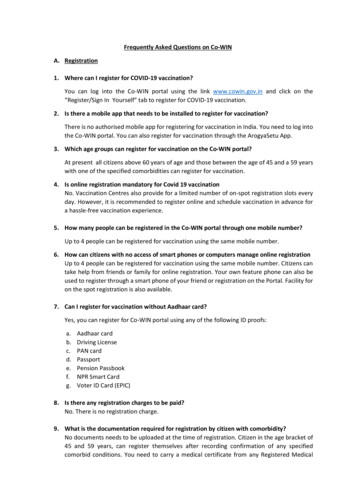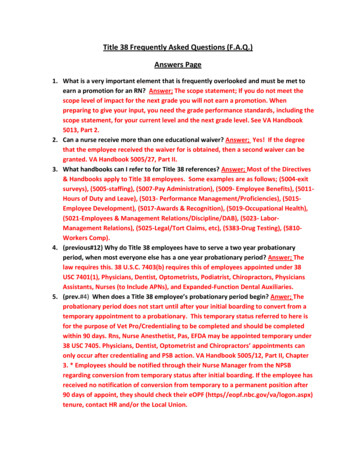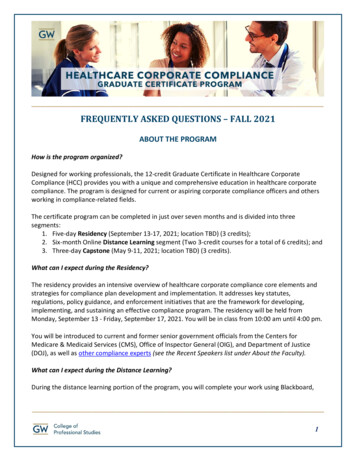
Transcription
FREQUENTLY ASKED QUESTIONS – FALL 2021ABOUT THE PROGRAMHow is the program organized?Designed for working professionals, the 12-credit Graduate Certificate in Healthcare CorporateCompliance (HCC) provides you with a unique and comprehensive education in healthcare corporatecompliance. The program is designed for current or aspiring corporate compliance officers and othersworking in compliance-related fields.The certificate program can be completed in just over seven months and is divided into threesegments:1. Five-day Residency (September 13-17, 2021; location TBD) (3 credits);2. Six-month Online Distance Learning segment (Two 3-credit courses for a total of 6 credits); and3. Three-day Capstone (May 9-11, 2021; location TBD) (3 credits).What can I expect during the Residency?The residency provides an intensive overview of healthcare corporate compliance core elements andstrategies for compliance plan development and implementation. It addresses key statutes,regulations, policy guidance, and enforcement initiatives that are the framework for developing,implementing, and sustaining an effective compliance program. The residency will be held fromMonday, September 13 - Friday, September 17, 2021. You will be in class from 10:00 am until 4:00 pm.You will be introduced to current and former senior government officials from the Centers forMedicare & Medicaid Services (CMS), Office of Inspector General (OIG), and Department of Justice(DOJ), as well as other compliance experts (see the Recent Speakers list under About the Faculty).What can I expect during the Distance Learning?During the distance learning portion of the program, you will complete your work using Blackboard,1
GW’s online learning system. The two courses taught remotely during the distance learning portion ofthe program cover discrete compliance topics providing you with an in-depth exploration of thehealthcare laws and regulations of particular concern to healthcare organizations. Featured federallaws include: Anti-Kickback Statute, Physician Self-Referral (Stark) Law, Civil False Claims Act, theEmergency Medical Treatment and Labor Act (EMTALA), the Health Insurance Portability andAccountability Act (HIPAA), Federal Income Tax, Foreign Corrupt Practices Act, and Federal AntitrustLaw.Each week you may have a multi-media lecture, assigned readings, quizzes and/or a writtenassignment. You should expect to spend about the same amount of time a conscientious studentwould spend on a live course including the time in class. The typical student spends about 4-6 hoursper week during the Distance Learning portion of the Program depending on how familiar the studentis with the material.These online courses allow you to work through the multi-media lectures, reading, assignments,quizzes and/or discussions at your own pace on your own timeline each week. The program also usesdiscussion questions (like a chat room) to stimulate interaction among you and your fellow students.Throughout the Distance Learning portion of the program, you will continue to work closely withfaculty.What can I expect during the Capstone?Using a case study, you will work both individually and as part of a group to investigate and presentyour findings and recommendations to an expert faculty panel. The Capstone exercise is a role-playingsimulation designed to illustrate how a compliance officer would be expected to deal with a real-lifeset of compliance problems. It combines written assignments with oral presentations and is intendedto serve as the ultimate evaluation mechanism for determining whether you have mastered theprocess skills and the rudimentary legal principles to function as a compliance officer.At the end of the program, you are expected to understand and be able to apply basic compliancerelated concepts and laws to a specific fact pattern in a very practical way. The Capstone will be heldMay 9 - May 11, 2021 and you will be in class from 9:00am – 5:00pm.2
OTHER COURSE-SPECIFIC ISSUESDo the courses have to be taken sequentially?Yes, the courses must be taken sequentially – PSHC 6201 - Introduction to Healthcare CorporateCompliance, followed by PSHC 6202 - Compliance with Specific Laws and Regulations I and PSHC 6204 Compliance with Specific Laws and Regulations II, and finishing with PSHC 6206 – Case Studies inHealthcare Corporate Compliance. Ideally students begin and complete the program with theirassigned cohort (Fall or Spring) over the course of seven months. However, exceptions are madeallowing students to join a later cohort if he/she is unable to complete one or more of the courses dueto extenuating circumstances.What if I fall behind in the online course?The HCC program is designed for working professionals. We understand that almost everyone in theprogram has a full-time job and other responsibilities and obligations. Faculty work to provide ampletime, including weekends, between availability of materials and assignment due dates. They also striveto be flexible with extensions as appropriate. However, all distance learning coursework must becompleted prior to attending the Capstone (PSHC 6206).Do I need to purchase books or other materials for the program?No. All materials will be provided to you through Blackboard, GW’s online learning system, and areincluded in the cost of your tuition. You won’t need to purchase any additional books or materials.How much of the program is focused on health care providers versus pharma or the device industry?The HCC program addresses compliance issues from the perspective of a broad range of healthcareindustry stakeholders including a range of provider organizations, pharmaceutical and medical deviceorganizations, health plans, and state and federal governments.3
ABOUT CHC CERTIFICATIONHow does the Health Care Compliance Association (HCCA) Compliance Certification Board (CCB) examrelate to your program? Is the CCB exam offered at the end of the Capstone at the AlexandriaCenter?The HCCA maintains a certification program for healthcare compliance professionals through their CCBCertification Program. In order to become certified in healthcare compliance, candidates mustdemonstrate relevant work experience or completion of an accredited university-based program andpass the Certified in Healthcare Compliance (CHC ) exam.GW’s HCC program is one of only a few university programs that the HCCA has accredited. You willqualify to take the CHC exam as a ‘student’ if you successfully complete the program. By qualifying asa ‘student’, the professional work experience requirement for the CHC exam is waived. The HCCprogram does not offer the exam, but there are a number of testing centers throughout the countrywhere the exam can be taken online. It is also offered at many HCCA sponsored events. Please visitHCCA’s website for more information.Graduates of the program who already have their CHC certification earn 40 CEUs for completing ourcourses, thus automatically qualifying them for reaccreditation.Do I have to get the CHC certification?No, it’s your choice. Some of our students choose not to take the exam, but it is a highly recognizedcertification for the profession. We’re happy to report that in a survey to our alumni, 100% of therespondents who took the exam reported passing.What is the difference between the GW HCC Program and training offered through HCCA?The GW HCC program is an accredited, university-based academic program. Graduates of the programreceive a Certificate in Healthcare Corporate Compliance from the George Washington University withall the benefits and resources that the University bestows on its graduates. Offered over the course of4
seven months, the program provides a comprehensive education in the development andimplementation of a corporate compliance program, including in-depth exploration of the relevantgoverning laws and regulations.The design of the program features small interactive classes with expert faculty, senior governmentleaders, and policymakers. It provides a unique opportunity for discussion and studies of the day-today challenges that confront compliance professionals and solutions. You will receive individualizedattention from the faculty, guest speakers, and their peers to help them respond to issues andproblems that you confront during the program and beyond.Furthermore, as the center of federal healthcare policy and enforcement, Washington, D.C. providesthe ideal location for the program. You have unparalleled intimate access to experts in the field,including current and former government regulators and policy makers as well as other complianceprofessionals.ABOUT GW HCC STUDENTSWhat is the background of the “typical” HCC student?Students and graduates of the HCC program come from a wide variety of backgrounds (medical, legal,healthcare administration, corporate compliance, health insurance, business, etc.) and levels ofexperience in healthcare corporate compliance. However, they are all united in their interest anddesire to learn and work in the field of healthcare corporate compliance.What level of compliance experience/background does a typical student have?Past students have had a variety of experience or backgrounds in compliance. We have had a fewstudents that are completely new to the field and several with more than 20 years of experience so it ishard to generalize. Most students have had some exposure to healthcare and/or compliance issues butthe program is designed to accommodate and challenge a range of experience levels.For someone who has little or no background in compliance or healthcare, will this program alone5
prepare me for a job?Corporate compliance is such an expanding field one that the basic skills and topics addressed by theprogram do provide a solid foundation for individuals interested in moving into the field. The moreexperienced students in our program and faculty also provide a tremendous resource both by sharingtheir substantive experiences and by providing excellent networking opportunities for students withless experience.Do I need experience coding in the compliance profession? Is coding covered in the curriculum?You do not need to have a background or experience in coding to be effective, successful complianceprofessional. Some individuals with prior experience in coding choose to enter the complianceprofession. The HCC program does not cover coding; however, it does provide an overview of claimsand billing processes from industry experts.SCHOLARSHIPS & FINANCIAL AIDAre there scholarships available for the program?There are no scholarships available through the HCC Program. If you either work or live in the City ofAlexandria, Virginia, you are welcome to apply for the Alexandria Partnership Fellowship. Please visittheir website for more information.Graduate certificate programs that are less than 18 credit hours do not qualify for Federal StaffordLoans; however alternative loans are a financing option. Please visit the GW graduate financial aid sitefor more information about alternative loans and payment plans.ABOUT THE PROFESSIONWhat is the average salary of a healthcare compliance officer?The HCCA conducts an annual survey of its members and the compliance officer industry. Theinformation is pulled together from responses from all over the country. The survey contains important6
information about salary, responsibilities, experience level, reporting structure and other key factors toa compliance officer's responsibility in an organization. It’s the single best source of salary informationavailable. Please visit their website to download a copy of the survey.TRANSFERRING CREDITSWill the credits earned transfer to other degree programs?Students who successfully complete GW’s HCC program are eligible to transfer credits into the Masterof Public Health Policy (MPH Health Policy) and Master of Health Administration (MHA) degree in theDepartment of Health Policy and Management, in the GW Milken Institute School of Public Health, ifadmitted to that degree program or into the Paralegal Studies Master of Professional Studies (MPS)degree program at the College of Professional Studies. Since GW is a fully-accredited university, creditsearned may also be transferable to other institutions of higher education. The number of creditsaccepted for transfer would be determined by the policies of the receiving institution.ASSISTANCE WITH JOB PLACEMENTIs there any assistance available for job/internship placement?As a student/alum of the program, you will have access to the College of Professional Studies CareerServices Office. Nicole Mintz, the Director of Career Services, is available to discuss your career plansand job search strategy including career planning, networking, resumes and cover letters, businessetiquette, interview, salary negotiation and obtaining internships and maximizing the benefits of theinternship experience. Nicole can be reached via phone at 202-994-7138 or email. You will also haveaccess to GWork CPS which is an online job and internship listings service.7
The HCC program addresses compliance issues from the perspective of a broad range of healthcare . admitted to that degree program or into the Paralegal Studies Master of Professional Studies (MPS) degree program at the College of Professional St
